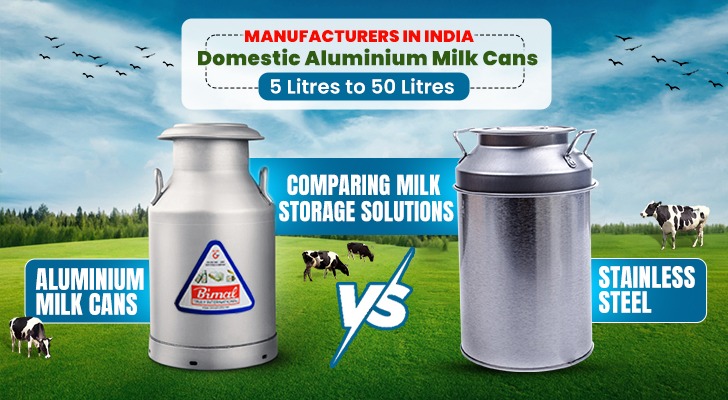Milk storage and transport are one of the major concerns in the dairy industry. Preserving the milk quality before it reaches the dairy processing plant is a challenge that many milk producers face. Especially in summer, when the risk of bacterial formation at higher temperatures is high, maintaining its form while in storage and during transit is vital for milk farmers. Therefore, the container of milk, or Milk cans, is designed to prevent spoilage and deliver securely to the daily consumers or distribution centers. Material quality of the container plays a critical role in this regard. Plastic, stainless steel and aluminium are popular materials for milk cans. However, plastic, due to its inferior material quality, is not ideal for the dairy business. But stainless steel and aluminium milk cans are widely preferred for their distinguished properties. In this blog, we will compare stainless steel and aluminium cans for milk storage solutions.
Aluminium Milk Can vs. Stainless Steel Milk Can
Aluminium and stainless steel are both widely preferred materials for manufacturing metal products. As milk cans, each offers its own set of benefits. Let’s explore the distinction between the two:
Weight
Aluminium: Aluminium is lightweight with a high strength-to-weight ratio. It can deliver high load carrying capacity while being light in weight itself. These cans provide the best ease of handling.
Stainless Steel: Stainless Steel is also lightweight, but is slightly heavier due to its higher density. Therefore, aluminium works better than stainless steel when the weight of the can is a prime factor.
Food Safety
Aluminium: Aluminium alloy cans are anodized, which enhances their hygienic properties. It creates a hard layer to improve the corrosion resistance and strength of the container. The heat transfer from aluminium is slower, hence it maintains the temperature of the milk for a long period.
Stainless Steel: Stainless steel milk cans are hygienic due to the smooth surface and antibacterial properties. It is resistant to scratches, and the high density prevents it from damage caused by moisture. The heat transfer from stainless steel is higher than aluminium, hence the milk can change form when the external temperature goes extreme.
Design Features
Aluminium: The aluminium milk can is built in a mono-block design, which means a single sheet is used to make the body with minimal joints. It reduces the risk of leakage, bacterial attacks, and other contaminants going into the milk from weak joints. The handle is joined by brazing process.
Stainless Steel: The joints in stainless steel milk cans are joined by welds and rivets, which increases the chances of contamination from the external environment and the risk of leakage.
Security
Aluminium: The aluminium milk can is provided lockable feature to prevent leakage, contamination, theft and tampering. It is essential during transportation and storage to avoid loss in business.
Stainless Steel: While stainless steel cans have a tightly-fitted lid, it does not have a lockable feature; hence, they are not preferred for transportation.
Recyclability
Aluminium: Aluminium is highly recyclable, therefore an eco-friendly option for milk storage and transportation.
Stainless Steel: Stainless steel is also recyclable, but not to the same degree as aluminium.
Conclusion: Aluminium Cans Work Better
As we can observe, the Aluminium Milk Can are a better solution in milk storage and transportation than SS milk cans. While SS milk can have hygienic qualities and more strength, it cannot be used for transportation. Also, they are more expensive than aluminium. Bimal Industries supports the dairy industry, serving the milk farmers who produce milk on a small to large scale. We provide them with reliable aluminium milk cans which are hygienic, safe, and durable with a long service life.

